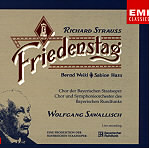Friedenstag is probably Richard Strauss’ least successful mature opera. Premiered in l938 in Dresden, it was first performed in Vienna in 1939 with Hitler in the audience. The plot, about the end of the Thirty Years War, is chock filled with the type of fraudulent sentiment about peace (and following orders) the Nazis were so fond of; indeed, the powers that were seem to have kept the opera alive for a couple of years until its almost dazzling lack of merit actually got the better of German and Austrian music lovers, who, Nazis or not, still had taste. It is remarkable how uninspired three-quarters of this one-act, 75-minute work are. Strauss himself referred to it as “wearisome”, he disliked Joseph Gregor’s libretto (and was helped on it by Stefan Zweig, who could not openly work with Strauss because he was a Jew), and found the whole thing “commonplace”. Indeed, the first half hour is duller than dirt and the final 20 minutes is lively but trite–which leaves us with about 25 minutes of exciting music, all of it focused around the Commandant’s wife, Maria (the only character with a name–or a tune, for that matter), her attempts to convince her husband to turn away from war, and her eventual oath to die with him. Her aria and their duet is inspired, the latter ending on a glorious, exultant high D-flat (barely audible here). As the pair, Bernd Weikl is nicely obstinate and the late Sabine Hass is close to wonderful. Elsewhere in the cast, Jaakko Ryhänen is a fine-sounding Guard, and the chorus, with plenty to sing in this live performance, is splendid. Wolfgang Sawallisch leads his Munich forces with power and passion, almost–but not quite–making a case for this work. Of course Strauss completists, such as I, will have to have it, and it’s probably the best performance of a mediocre work we’ll ever encounter.
































